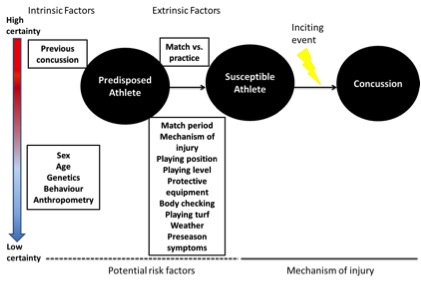The concussion puzzle: is there a risk profile for sport-related concussion?
 Figure 1: A proposed model summary of the systematic review of literature and adapted from Meeuwisse’s athletic injury aetiology model [7].
Figure 1: A proposed model summary of the systematic review of literature and adapted from Meeuwisse’s athletic injury aetiology model [7].
From all previous risk factors identified for sports concussion, only a previous concussion(s) and playing a match compared to practice has strong scientific evidence.
Concussion is caused by a force transmitted to the head resulting in symptoms ranging from a severe headache to loss of consciousness and is one of the more severe sports injuries with professional club rugby players missing up on average 12 days during two seasons [1,2]. A reported compensation pay-out of over $700 million by the American National Football League (NFL) to over 4500 former NFL players or their relatives for severe and debilitating complications, they claim resulted from concussions sustained whilst playing NFL [3,4]. This widely publicised court case has raised concern over concussion injuries not only in athletes and their families across sports [5], but also sporting organisations such as the International Rugby Board (IRB), which has implemented a controversial side-line concussion test for suspected concussions [6].
However, sport related concussion still remains a hotly debated injury mainly due to the lack of understanding of the aetiology and the individual variations in symptom presentation, which makes diagnosing and managing concussions challenging. In light of this, our research team undertook a comprehensive systematic review of the scientific literature on concussion risks that was recently published online (http://bjsm.bmj.com/cgi/content/full/bjsports-2013-092734). After a critical search and evaluation of over 13 000 articles, we identified 86 scientific research articles investigating possible risks for concussion in sport with the main findings summarised below:
- Athletes who have experienced a previous concussion(s) and playing a match compared to practice were the only concussion risks supported by strong scientific evidence.
- Although experts often state children and women are vulnerable groups[8], gender and age were amongst several potential risk factors for concussion which require further robust studies to confirm risk effect.
Although there is an abundance of papers on concussion in the scientific literature, there is still a need for robust research, preferably follow-up studies with sufficient sample sizes, to confirm concussion risks.
We suggest that there are inter-individual differences in the aetiology and manifestation of concussion and as such we are conducting a research study to investigate the genetic and non-genetic role underlying concussion risk and recovery. The future goal of this study is to further understand concussion in order to provide a model for individual diagnosis and therapy strategies improving concussion management especially in vulnerable groups such as youth players. To this end, we are in the process of inviting the top rugby-playing schools in South Africa and thus far extend our gratitude to Wynberg Boys’, Paarl Boys’, Paarl Gimnasium, SACS and Boland Landbou high schools who have eagerly accepted our invite to participate in our research study. We are equally excited to embark on this venture with them, as well as other top rugby playing high schools, to investigate why the incidence of concussion is so high our youth rugby players.
References:
- McCrory P, Meeuwisse WH, Aubry M, et al. Consensus statement on concussion in sport: the 4th International Conference on Concussion in Sport held in Zurich, November 2012. Br J Sport Med 2013;47:250–8
- Brooks JHM, Fuller CW, Kemp SPT, et al. Epidemiology of injuries in English professional rugby union: part 1 match injuries. Br J Sport Med 2005;39:757–66.
- Boren C: NFL, ex-players reach settlement over concussion lawsuits. The Washington Post online, August 29, 2013. Available at http://www.washingtonpost.com/blogs/early-lead/wp/2013/08/29/nfl-former-players-to-settle-concussion-lawsuits-judge-says/ (accessed on 25 September 2013)
- Crepeau R: The NFL Concussion Settlement. The Huffington Post blog online, September 04, 2013. Available at http://www.huffingtonpost.com/richard-crepeau/nfl-concussion-settlement_1_b_3853120.html (accessed on 27 September 2013)
- Peters S: Moody: We used to treat concussion as a joke… now I worry about dementia. The Daily Mail online, September 22, 2013. Available at: http://www.dailymail.co.uk/sport/rugbyunion/article-2428431/Lewis-Moody-We-used-treat-concussion-joke–I-worry-dementia.html (Accessed on 29 September 2013)
- Guyer J: IRB to review sideline concussion test. The Wide World of Sports online, July 18, 2013. Available at http://wwos.ninemsn.com.au/article.aspx?id=8691586 (accessed 20 September 2013)
- Meeuwisse W. Assessing causation in sport injury: A multifactorial model. Clin J Sport Med. 1994;4:66–170
- Kutcher JS, Eckner JT. At-risk populations in sports-related concussion. Current sports medicine reports 2010;9:16–20
About the Authors:
Shameemah Abrahams majored in Biochemistry and Physiology for her undergraduate BSc (2008 – 2010) with honours in Physiology, specialising in Neuroscience, (2011) at the University of Cape Town (UCT). She is currently (2012-) in her second year as a MSc (Med) student at the UCT/MRC Exercise Science and Sports Medicine research unit, UCT. Her MSc project deals with both the identification of genetic and non-genetic predisposing factors of concussion risk in South African rugby players. Her research interests include brain injury, physiological changes during exercise and genetic predisposition to injury.
Sarah Mc Fie completed a BSc in Chemical, Molecular and Cell Biology, majoring in Genetics and Human Biology, in 2010 and an Honours specializing in Neuroscience in 2011 from the University of Cape Town. She started her current degree, an MSc in Exercise Science, at the Exercise Science and Sports Medicine research unit, UCT, in 2012. Her MSc research project aims to identify intrinsic and extrinsic risk factors for risk and severity of sport-related concussions. Her research interests include genetics, neuroscience and sport.